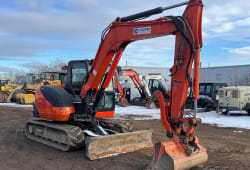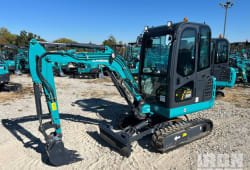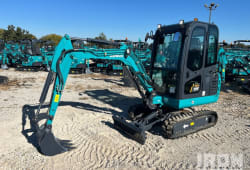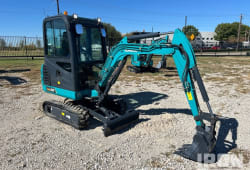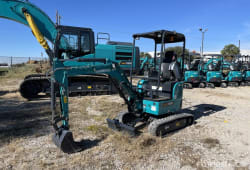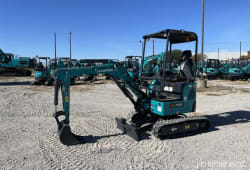The Role of Mini Excavators in the Heavy Machinery Market
4 Min read
)
March 14, 2024
Mini excavators have become indispensable assets in the construction and heavy machinery industry. These compact yet powerful machines offer a wide range of functionalities, making them ideal for various tasks. Whether it's digging trenches, demolishing structures, or landscaping, mini excavators excel in versatility and efficiency.
Types of Mini Excavators
Mini excavators come in various sizes and configurations, ranging from compact models suitable for tight spaces to larger units with enhanced capabilities. Some common types include micro, mini, and midi excavators, each tailored to specific applications. Compared to traditional excavators, mini excavators are smaller in size and more maneuverable, making them perfect for urban construction projects and residential areas.
Advantages of Mini Excavators
One of the primary advantages of mini excavators is their maneuverability. Their compact size allows them to access tight spaces and navigate through obstacles with ease, reducing the need for manual labor and saving time. Additionally, mini excavators are highly versatile, capable of performing a wide range of tasks such as digging, lifting, and grading. This versatility makes them a cost-effective solution for contractors and construction companies.
Applications of Mini Excavators
:format(webp))
Mini excavators find applications across various industries, including construction, landscaping, and utility work. In construction projects, they are used for tasks such as digging foundations, trenches, and holes. In landscaping and gardening, mini excavators help in grading land, installing irrigation systems, and moving heavy materials. Moreover, mini excavators are essential for utility work, such as repairing pipelines, laying cables, and clearing debris.
Factors to Consider When Buying Mini Excavators
When purchasing a mini excavator, several factors need to be considered to ensure the right fit for the job. Size and weight are crucial considerations, as they determine the machine's maneuverability and transportability. Engine power and fuel efficiency are also important, as they impact performance and operating costs. Additionally, buyers should consider the availability of attachments and accessories, which enhance the machine's functionality and versatility.
Tips for Maintenance and Care
Proper maintenance and care are essential for prolonging the lifespan of mini excavators and ensuring optimal performance. Regular servicing and inspections help identify any issues early on and prevent costly repairs down the line. Proper storage and transportation are also important, as exposure to harsh weather conditions and rough handling can damage the machine.
Popular Brands in the Market
Several brands dominate the mini excavator market, each offering a range of models to cater to different needs and budgets. Some popular brands include Caterpillar, Kubota, Bobcat, and Komatsu. Customer reviews and recommendations can help buyers make informed decisions, taking into account factors such as reliability, durability, and after-sales support. Pricing and warranties are also important considerations when choosing a mini excavator.
Reselling Mini Excavators
With the growing demand for mini excavators, there is also a thriving market for reselling used machines. Contractors and construction companies often sell their old equipment to upgrade to newer models or downsize their fleets. To successfully resell mini excavators, sellers should assess the market trends and demands, accurately price their equipment, and provide detailed documentation and maintenance records to potential buyers.
Conclusion
In conclusion, mini excavators play a vital role in the heavy machinery market, offering unparalleled versatility, efficiency, and maneuverability. From construction projects to landscaping and utility work, these compact machines excel in a wide range of applications, making them indispensable assets for contractors and construction companies alike.
FAQs (Frequently Asked Questions)
Are mini excavators suitable for residential construction projects?
Yes, mini excavators are highly suitable for residential construction projects due to their compact size and maneuverability, allowing them to access tight spaces with ease.
What are some common attachments available for mini excavators?
Common attachments for mini excavators include buckets, augers, hydraulic breakers, and thumbs, each serving specific purposes such as digging, drilling, and demolition.
How often should I service my mini excavator?
Mini excavators should be serviced regularly, ideally every 250-500 operating hours or as recommended by the manufacturer. Regular servicing helps identify any issues early on and ensures optimal performance.
Can mini excavators be used for snow removal?
Yes, mini excavators can be equipped with snow removal attachments such as snow blades and snow blowers, making them suitable for clearing snow from driveways, sidewalks, and parking lots.
What are some key factors to consider when reselling a mini excavator?
Some key factors to consider when reselling a mini excavator include assessing market trends and demands, accurately pricing the equipment, providing detailed documentation and maintenance records, and offering attractive financing options or warranties to potential buyers.

Javier Bocanegra is Boom & Bucket's Technical Resolutions Lead, drawing on 10+ years in automotive and heavy equipment to diagnose issues, resolve complex post-sale cases, and keep machines - and customers - running smoothly. A certified heavy-equipment specialist, he's known for meticulous inspections and hands-on expertise across mechanical, electrical, and hydraulic systems. Based in Sacramento, Javier partners closely with buyers, vendors, and our field teams to deliver reliable outcomes and uphold our standards for safety and trust.
